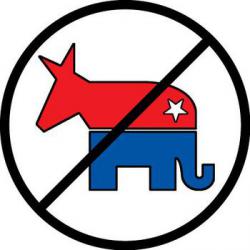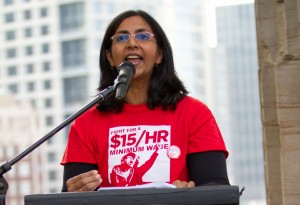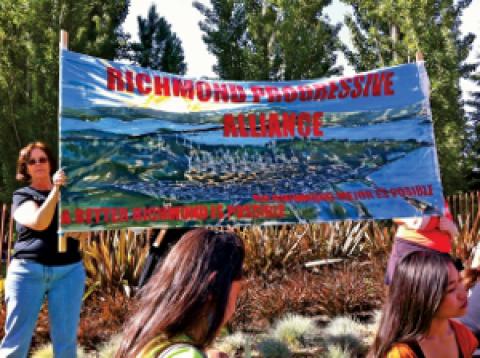- Left, Independent Political Action Conference: Unprecedented Cooperation - Dan La Botz (New Politics)
- Three Conferences and a Postscript - Ethan Young (Portside Exclusive)
Left, Independent Political Action Conference: Unprecedented Cooperation
By Dan La Botz
May 5, 2015
New Politics
Some 200 political activists from a variety of independent political organizations, as well as individual activists, carried out a rich discussion and an amicable debate about how to collaborate in the work of building a large political alternative to the left of the Democratic Party. Participating in the Future of the Left/Independent Politics Conference, in an unprecedented spirit of cooperation, national, state, and local candidates and activists, as well as elected officials from the Green Party, the Peace and Freedom Party, the Richmond Progressive Alliance, Socialist Alternative, and the Vermont Progressive Party discussed the challenges of campaigning and the difficulties of actually holding office while trying to both build movements and push progressive policies. Also at the conference were members of Progressive Democrats of America and the Justice Party.
A number of the leading figures of independent politics in America participated. Kshama Sawant of Socialist Alternative, a member of the Seattle City Council, spoke to the group via video. Former Green Party presidential candidate Jill Stein and former Green Party vice-presidential candidate Rosa Clemente spoke, as did 2014 New York gubernatorial candidate Howie Hawkins. Other speakers included Gayle McLaughlin of the Richmond Progressive Alliance and Richmond City Council member, Susan Sadlowski Garza, who was recently elected to the Chicago City Council, and Angela Walker who ran for sheriff in Milwaukee as an independent socialist.
Though not part of the formal agenda, the just-announced campaign of Bernie Sanders, an independent and self-identified socialist who will run for the Democratic Party presidential nomination--and who had sent greetings to the conference--became a topic of discussion in several sessions. While some said they would support a Sanders campaign because it would raise the important issues and contribute to activism, others felt-as Bruce Dixon of the Georgia Green Party put it-that Sanders was a sheep dog whose job was like that of Rev. Jesse Jackson and Congressman Dennis Kucinich in earlier elections, to round up folks who had strayed to the left in response to the Democratic Party's retrograde domestic and foreign policies and to bring them back to the Party.

Responding to the country's pervasive economic and social crisis, to widespread public support for movements such as Occupy, Black Lives Matters, and Fight for $15, and to recent successes in independent left campaigns, the conference expressed a sense of optimism about the possibilities for not only running left candidates, and winning elections, but also for building a larger left political presence while both expressing and helping to organize and expand the social movements. While this was a conference about political action, the organizers made it clear through panels on the Black Lives Matter movement and the Fight for $15 that politics must be about building and giving voice to such movements.
Robert Caldwell of Solidarity, one of the chief organizers of the event, and Debra Reiger, the chair of the California Peace and Freedom Party and also one of the organizers, told the gathering in a final report that the number of participants, the spirit of collaboration, and the richness of the discussion exceeded the organizers' expectations. During an evaluation period, many speakers rose to commend the spirit of mutual respect, cooperation, and solidarity that the conference had engendered. Speaking for the organizing committee-which includes representatives of most of the participating parties, together with the International Socialist Organization (ISO), Socialist Alternative, and Solidarity, as well as Black Agenda Report-Caldwell and Reiger announced that a continuations committee would take up the question of now to keep alive the network established by the conference. They also recognized the need for greater diversity, for greater involvement of African American and Latino activists, and for simply casting a wider net and drawing in others involved in such political campaigns.
Panels and Workshops
While this was a conference of the American independent left, there was also an international element. Soren Sondergaard of the Danish Red-Green Alliance offered international greetings, while Sascha Nemseff Villagrán, a member of the Spanish Podemos Party, and Alan Akrivos of Socialist Alternative and the Greek Syriza, discussed the challenges facing these two parties which stand at the moment at the center of the fight between capital and labor over austerity in Europe.
Aware that we are building on political efforts of the past, there were various discussions of earlier movements and their experiences. Lance Selfa of the International Socialist Organization, and author of The Democrats: A Critical History, opened the conference by providing an overview of today's two-party system. Prof. Mark Lause, a longtime Green Party activist, discussed the history of the Socialist Party and the Progressive Party in the late nineteenth and early twentieth century. New York Green Party leader Gloria Mattera discussed the history of the Labor Party of the United States that was founded in 1996, and of the Green Party. Unfortunately sudden illness and hospitalization kept Kali Akuno of the Malcolm X Grass Roots Movement (MXGM) and the Chokwe Lumumba campaign from talking about electoral politics and Black liberation. There were also talks by Bruce Dixon on the Black Panther Party, by Jesus "Chuy" Negrete on the La Raza Unida Party, and by Guy Miller on the Socialist Worker Party campaigns of the 1960s and 1970s.
Many of the participants brought years of experience in organizing independent political campaigns, so naturally the nuts-and-bolts of organizing were also on the agenda, as were the challenges of actually holding office. Several speakers from various parties talked about ballot access and the fight for inclusion in debate, while others discussed fundraising, field operations, and voter registration. Marsha Rummel of Progressive Dane (County) and Madison City Councilperson and Gayle McLaughlin of the Richmond City Council discussed the difficulties of holding office while trying to fight for progressive change and simultaneously build the movements.
During the next year and a half, the question of how we relate to the Sanders campaign, which has the potential to reach and involve millions of progressives, will be challenging. Even those who opposed endorsing Sanders suggested that advocates of independent political action should maintain a friendly attitude to Sanders supporters. When the seemingly inevitable nomination of Hillary Clinton occurs, it may be possible to win over many of these people to an independent, left, third party perspective.
The Future of the Left/Independent Politics Conference represented an important step forward not only for independent politics but also for cooperation on the left. The challenge now will be to find ways for the organizations and individuals involved in this conference to keep alive the network we have founded, while continuing our work in local movements and independent political campaigns.
[Dan La Botz is a member of Solidarity and a co-editor of New Politics, both of which endorsed The Future of Left/Independent Action in the United States Conference. He served on the conference organizing committee.]
There's Gotta Be a Better Alternative
Three Conferences and a Postscript
By Ethan Young
May 14, 2015
Exclusively for Portside
Dan La Botz's description of the Future of the Left/Independent Politics Conference makes another introduction redundant. Instead, I'll add my own observations. I come from the other side of this discussion: I hold with the `inside/outside' approach to electoral politics, as pushed by the late Arthur Kinoy, a radical lawyer who led the National Committee for Independent Political Action in the 70s and 80s. Putting it simply, I supported left independent Barry Commoner for president in 1980, and Democrat Harold Washington for mayor of Chicago in 1983. This year, I support Kshama Sawant and Bernie Sanders. I see no contradiction - in fact I think it's the only approach that makes sense.
In Chicago, I saw what I expected - a meeting concerned primarily with electoral work outside, and in opposition to, the Democrats. Not just Centrists and Blue Dogs, but the Congressional Progressive Caucus, and fusion parties like the Working Families Party. Those who work in Democratic campaigns, even social movement activists or self-proclaimed socialists, are viewed as strays or worse. However, not everyone there held a hard line on this, and for some participants, it barely entered the conversation.
The Chicago meeting gave this non-participating observer a good idea of the progress being made in creating a left political opposition in a number of distinct population centers. Just a small gathering, in the broader scheme of things, but full of lessons and insights. The group as a whole was serious about sharing opinions and experiences, and while there were low points, for the most part the discussants kept it at a mutually respectful level.
I actually witnessed three conferences. One was a fascinating and enlightening array of talks about campaigning, organizing and governing. Participants networked, and the sessions explored some of the important questions. In many ways it fell short - there was very little discussion of the rise of the far right, the issue of third parties as "spoilers" aiding the Republicans, or the unmistakable rise of populism as a political vehicle for both the far right and the far left. On the positive, there was special attention given to Fight for $15 and Black Lives Matter, non-electoral social movements that have a direct impact on the left agenda.
There was a distance - not really a division - over the importance of turning that agenda into a program. Leaders of the Richmond Progressive Alliance made the case that full blown programs not only do not win elections, but fail even as an educational tactic. The choice of candidate, and determining the issues that are immediate and pressing for the base, take priority. This is in contrast to the traditional left third party approach of running up a flag and expecting voters to rally. RPA, without touching on the `inside/outside' question, argued effectively for an approach based on full appreciation of local conditions, careful coalition building, and making appropriate moves in response to shifting political relationships. They now dominate city government in Richmond CA, a working class suburb of Oakland, having handed a major defeat to Chevron Oil, which called the town its own for decades.
Organizers and strategists from other local efforts gave detailed testimony, and the responses were mostly congenial. But it was hard to tell what was really absorbed by the attendees, and what was just politely applauded.

Kshama Sawant, running as a socialist in a non-partisan election was elected to the Seattle City Council, Nov. 2013.
credit: Socialist Alternative
The second, simultaneous conference was an experiment in united action between Solidarity, the conference initiators; International Socialist Organization, the largest socialist group in attendance; Socialist Alternative, the one socialist group that could actually claim a win in its own name (Sawant's seat on the Seattle city council), and left Greens. Solidarity pushed networking and sharing experiences. ISO has taken on the role of proselytizer for the `'no to Democrats" line, to the point of denouncing fusion parties like Working Families and opposing the campaign of Jesús `Chuy' García for mayor of Chicago. Socialist Alternative was in on the discussion but mainly concerned with drumming up support for Sawant's uphill reelection campaign. Greens were thinking ahead to the 2016 presidential race.
It was not remarkable that each party had their own reasons for being there, or their own approaches. That's par for the course in politics. The surprise was the lack of tension or bickering. The groups were represented by members who knew how to work with outsiders without muting their messages. This should not be a big deal, but with the fragmented state of the left, it is.
It should be noted, though, that important electoral coalitions were not present. I can't say if the organizers knew of New Haven Rising, Florida New Majority, or Virginia New Majority, or others taking an `inside/outside' approach; or if those groups knew about the conference. But I would say that the organizers just skimmed the surface of the growing left electoral movement.
Meanwhile, a third conference was also playing out. Early in the weekend someone raised the Sanders campaign, and moderator Joanna Misnik "solemnly" declared, "The elephant has entered the room." Sanders had just declared, and the issue was argued out but not resolved. My estimate is that most of the attendees consider Sanders's campaigning as a Democrat a deal-breaker. Others, including those who supported Chuy and the various left aldermanic candidates who ran in the Chicago runoff, were excited by the news. The largest local party there, Vermont Progressive Party, has long-standing ties to Sanders, and does not consider his current move in any sense a betrayal.
Sanders sent a message to the conference via the VPP, which said in closing:
"I concluded that running an effective 50-state campaign, as a third party independent, was neither feasible nor the best way to raise, before the broadest possible audience, issues and problems that our mainstream parties routinely ignore.
"I strongly believe your efforts . are still very complementary to the national electoral campaign that I just announced this week. And I hope that the spirit of cooperation reflected in your meeting agenda will extend to our mutual ability to work together, now and in the future."
A response was circulated after the conference closed:
"As participants in the Future of Left and Independent Politics conference held in Chicago May 2-3, we sincerely appreciate your declaration of support for our efforts. Nonetheless, we must express our regret that you have chosen to forgo independent political action and instead enter the primaries of the Democratic Party, which is entirely beholden to Wall Street and the corporate interests you have fought throughout your career. And while we do appreciate the support you have offered to a few independent campaigns in Richmond, Madison and Chicago, we cannot condone your indirect funding of corporate Democrats such as Sens. Mary Landrieu, Mark Begich and Kay Hagan, or your failure to criticize Democratic Gov. Peter Shumlin's recent betrayal of the campaign for single-payer health care in your home state of Vermont.
"Nevertheless, we look forward to welcoming you and your supporters back into the movement for independent political action after the Democratic primaries are over and Hillary Clinton or another corporate Democrat is nominated. Such a return to your green and socialist roots and to your earlier anti-war politics will be the most principled resolution of the false and contradictory situation into which you have placed yourself and your supporters by joining the Democratic Party and - as one of our conference speakers noted - serving as the `sheepdog' to herd progressives and activists back into the two-party system.
"Conference participants Mark Lause, Fred Murphy, John Halle, Louis Proyect, Matt Hoke, Margaret Flowers, Kevin Zeese, Howie Hawkins, Paul Street, Linda Thompson, Joanne Landy, Dan LaBotz, Bruce Dixon, Thomas Harrison, Michael Pugliese"
This letter did not speak for the conference. None of the signers are associated with either Socialist Alternative or ISO. In fact, since the conference, Socialist Alternative expressed support for the Sanders campaign.
So the spectre of Bernie is still in the air. The announced result of the conference, as La Botz notes, is a network of activists with plans to keep in touch and organize another conference. I expect that the strengthened alliance between socialists and left Greens will play out at the next Green Party convention, and in the 2016 race, which will probably see Jill Stein, an enthusiastic conference participant, leading the Green ticket.
At least some of the participants will take on the problem of unity as de-fragmenting the left through political alliances, and not, as the letter signers put it, "sheepdogging" the movement.
[Ethan Young is one of the moderators of Portside. He lives in Brooklyn and works with Left Labor Project and People for Bernie Sanders.]



Spread the word